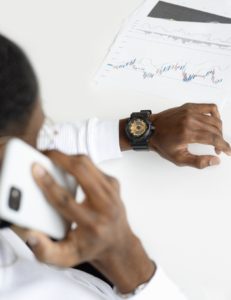
Trader Trade-Offs
Let me set the scene:
You’re sitting at your trading desk, about an hour into the session. You are using a strategy, like the ones taught in the Disciplined FX Scalping Course, which requires a specific market order entry.
The good news is that you don’t have to guess where to enter. The bad news is that you need to be ready to enter at any given moment during the session.
Just as price is nearing a potential entry-level, you feel a gurgling sensation in your gut.
Uh-oh.
You know what’s coming.
It’s time to go to the bathroom.
But it’s also almost time to take your trade…
Now, the obvious question that’s coming next is… are you going to miss your trade or risk pooping in your chair in order to show up for your strategy?
That’s one way to approach this.
But I think there’s another way to frame this question, which speaks to the crux of this dilemma –
Would you be okay with pooping your pants in order to take a trade?
What I’m trying to get at is this – What trade-offs are you willing to make in order to not just trade, but ultimately make money from trading?
On an immediate level, you may already be swapping a good night’s sleep in order to be present for certain market sessions. You may be forfeiting Taco Tuesdays with friends so you can prep your next trading session.
But then there are trade-offs that come with greater risks.
Market Wizard, Linda Bradford, told Jack Swagger about being on call with her broker while in labor at the hospital.
You may be reading this right now with the notion in your mind that, yes, you are completely okay with soiling your pants in order to possibly land a winning trade.
And that’s okay, I’m not here to judge what’s within or beyond your comfort zone of trade-offs.
Instead, I want to direct you to consider the ways in which you are willing to make adjustments in your life in order to succeed at trading. I also want you to consider what you want to ask of trading to adjust to you.
This means that you don’t just keep bending yourself to try to capture as many trading edges as possible, but instead lay out what your ideal trading session is first. And then go find ways to best trade for profit during that time.
For example, I’m getting fed up with waking up at 5:00 am PST in order to trade the New York session. I have medical issues that destroy my ability to sleep well. I don’t have the option to sleep-in, should my body need it, if I want to be sure to follow my strategy correctly. So n ow, I’m looking at ways to scalp either the end of the New York session or the Asian session.
ow, I’m looking at ways to scalp either the end of the New York session or the Asian session.
Is scalping difficult? Yes, it comes with a long learning curve (mostly due to the emotional nature of scalping, not necessarily the ability to craft a winning strategy). Does the Asian session have less volume than the others? Absolutely.
But if I continue to force-fit myself to meet the best practices of most traders, I run the risk of disempowering my discipline if I’m not “awake” or if I’m feeling emotional from not sleeping well.
If you want an outcome badly enough, you will find a way to make it work.
My ultimate point in writing this piece is to draw attention to the various trade-offs that come with developing your trading skills, choosing a trading style, and selecting a time to trade. They’re not obvious. There may be empirically “more profitable” or “less profitable” styles and strategies with trading, but they must be understood in the context of your own life, your current trading skill level, your psychology, and your appetite for risk.
No one else but you should make the final decision regarding what you want to do with your trading system. People (hopefully experienced traders and not some social media trend) can make suggestions from their own experiences, but what will ultimately guide you towards profitability and profitability for years to come is going to be unique to you.
This is why the mechanical strategies I teach in my course all suggest different ways you can backtest and adjust the strategy to your own suiting – whether that means trading during a different market session, a different currency pair, or even a different time frame. I believe that the strategies that you will be trading with as a routinely profitable trader will possibly echo the mechanics of other’s strategies, but ultimately have a personal touch of your own, even if just to adjust an indicator setting.
So if you’re A-okay with pooping your chair while you scalp the market, then that’s something important to know about yourself as you trade. If you need the guidance of reputable courses and mentors to help you along, or you’re committed to only consuming free content, both have ways in which they are perfectly reasonable and wise. Don’t let anyone else tell you otherwise. As you learn and grow as a trader, remember that you are in the driver’s seat of your own journey. Find the equilibrium of trade-offs that makes the most sense for you.




The offer is still valid. Details https://zetds.seychellesyoga.com/jml
Content for your website https://zetds.seychellesyoga.com/info
Web Development Wizards https://zetds.seychellesyoga.com/info
Can provide a link mass to your website https://zetds.seychellesyoga.com/info
Your site’s position in the search results https://zetds.seychellesyoga.com/info
Free analysis of your website https://zetds.seychellesyoga.com/info
Content for your website https://zetds.seychellesyoga.com/info
Web Development Wizards https://zetds.seychellesyoga.com/info
Can provide a link mass to your website https://zetds.seychellesyoga.com/info
Your site’s position in the search results https://zetds.seychellesyoga.com/info
Free analysis of your website https://zetds.seychellesyoga.com/info
SEO Optimizers Team https://zetds.seychellesyoga.com/info
I really liked your site. Do you mind https://zetds.seychellesyoga.com/info
Here’s what I can offer for the near future https://zetds.seychellesyoga.com/info
You will definitely like it https://zetds.seychellesyoga.com/info
Content for your website https://ztd.bardou.online/adm
Web Development Wizards https://ztd.bardou.online/adm
Can provide a link mass to your website https://ztd.bardou.online/adm
Your site’s position in the search results https://ztd.bardou.online/adm
Free analysis of your website https://ztd.bardou.online/adm
SEO Optimizers Team https://ztd.bardou.online/adm
Cool website. There is a suggestion https://ztd.bardou.online/adm
I really liked your site. Do you mind https://ztd.bardou.online/adm
Here’s what I can offer for the near future https://ztd.bardou.online/adm
Content for your website https://ztd.bardou.online/adm
Web Development Wizards https://ztd.bardou.online/adm
Can provide a link mass to your website https://ztd.bardou.online/adm
Your site’s position in the search results https://ztd.bardou.online/adm
Free analysis of your website https://ztd.bardou.online/adm
SEO Optimizers Team https://ztd.bardou.online/adm
I offer mutually beneficial cooperation https://ztd.bardou.online/adm
Cool website. There is a suggestion https://ztd.bardou.online/adm
Content for your website http://myngirls.online/
Web Development Wizards http://myngirls.online/
Can provide a link mass to your website http://myngirls.online/
Your site’s position in the search results http://myngirls.online/
Free analysis of your website http://myngirls.online/
SEO Optimizers Team http://myngirls.online/
I offer mutually beneficial cooperation http://myngirls.online/
Content for your website http://fertus.shop/info/
Web Development Wizards http://fertus.shop/info/
Can provide a link mass to your website http://fertus.shop/info/
Your site’s position in the search results http://fertus.shop/info/
Free analysis of your website http://fertus.shop/info/
SEO Optimizers Team http://fertus.shop/info/
I offer mutually beneficial cooperation http://fertus.shop/info/
Cool website. There is a suggestion http://fertus.shop/info/
I really liked your site. Do you mind http://fertus.shop/info/
Here’s what I can offer for the near future http://fertus.shop/info/
You will definitely like it http://fertus.shop/info/
The best prices from the best providers http://fertus.shop/info/
Additional earnings on your website http://fertus.shop/info/
Analytics of your website http://fertus.shop/info/
I would like to post an article http://fertus.shop/info/
How to contact the administrator on this issue http://fertus.shop/info/
Shall we exchange links? My website http://fertus.shop/info/
The offer is still valid. Details http://fertus.shop/info/
We offer cooperation on SEO optimization http://fertus.shop/info/
Content for your website http://fertus.shop/info/
Web Development Wizards http://fertus.shop/info/
Your site’s position in the search results http://fertus.shop/info/
Your site’s position in the search results http://fertus.shop/info/
SEO Optimizers Team http://fertus.shop/info/
It’s aan amazing paragraoh inn support of alll thee internet visitors; theey
will gett benefit fro it I am sure.
Having read your posts. I believed you have given your readers valuable information. Feel free to visit my website UY5 and I hope you get additional insights about Marketing as I did upon stumbling across your site.